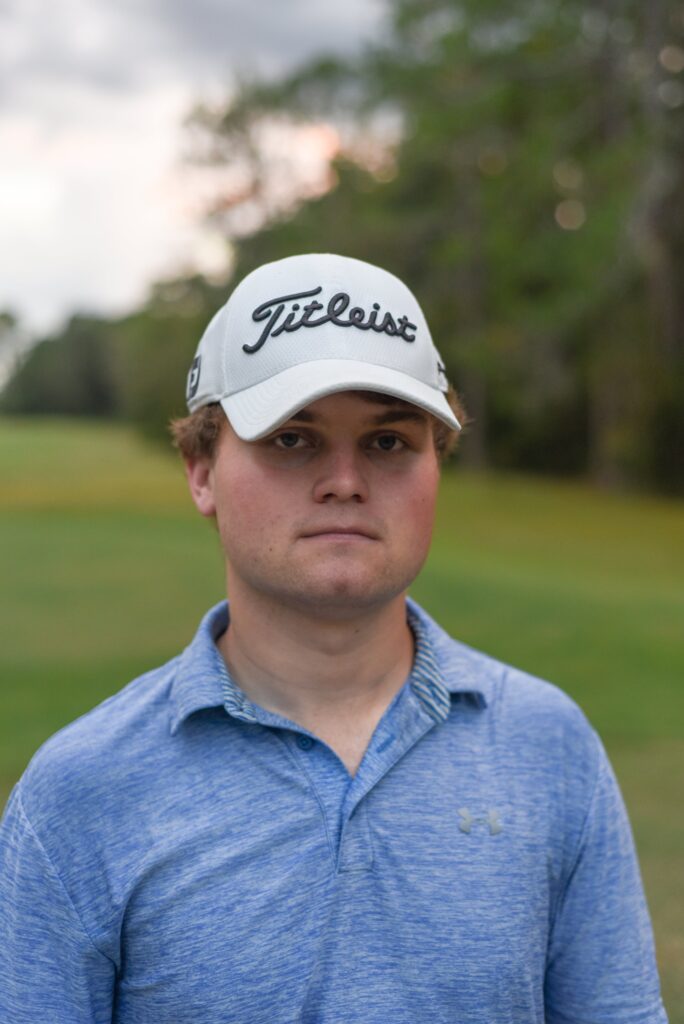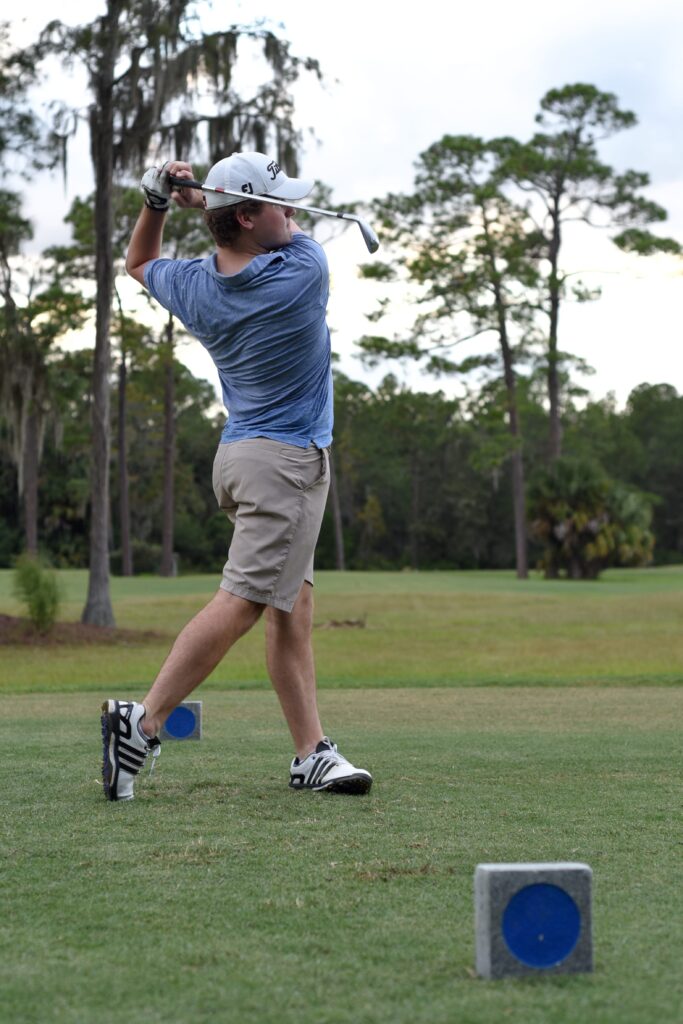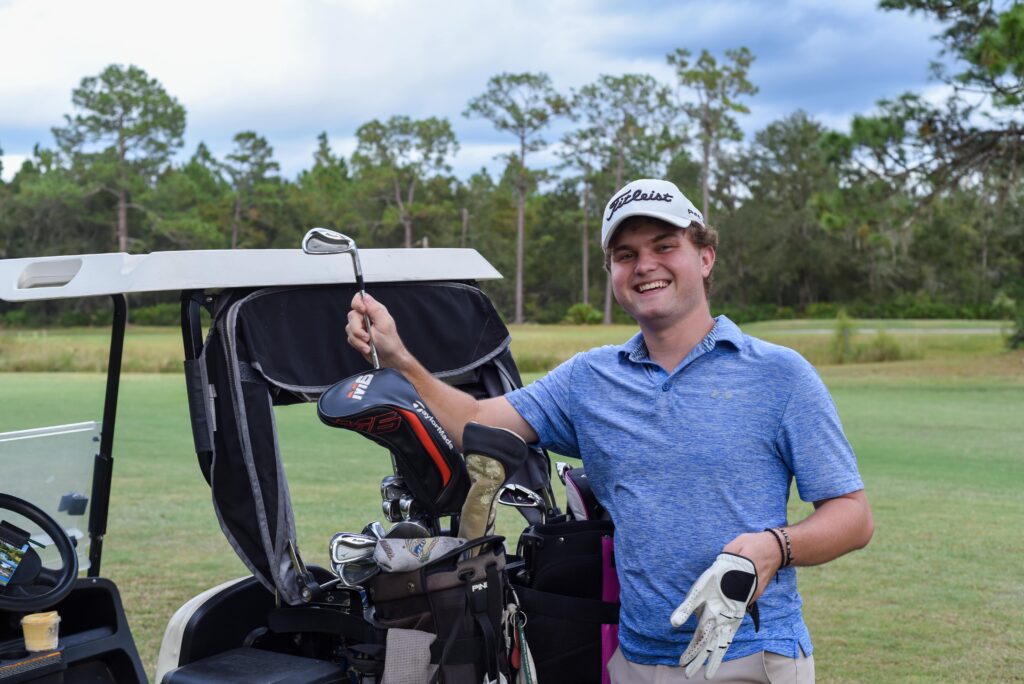Discovering the difference between physical and emotional solitude

Ryan Haley started golf at 7 years old and played competitively in high school. The sport’s isolation reflected his own adolescent social struggles.
December 19, 2022 | Story by Ryan Haley | Photos by Julia Coin
This article is part of Atrium’s Winter 2022 issue. To view the print edition online, visit our Issuu here.
I ran my finger around the edge of my glass, my tongue pressed flat against my front teeth as my mom threw out the same line I’d grown to dread, a song destined to never change tune.
“I’m just glad you had golf in high school, a reason to be outside,” she said as pride and comfort blazed across her face. “It gave you such a good outlet. You were so much better for it.”
I knew the feeling well, the quiet resentment building below my lungs.
Golf got you outside. Golf gave you an escape. Golf made you happy.
For years, I never grasped why these words bothered me so much. I practically lived on a golf course my first three years of high school, so why did I feel uncomfortable? Did I despise being labeled as a man of singular dimension, a one-trick pony?
In that Al’s Pizza booth the Tuesday before Thanksgiving, I realized I’d spent too much time focused on the wrong word.
Better.


Haley, typically donning this blue shirt and white hat, would walk a mile to the local golf course after class in high school if neither parent could drive him to practice. He played for his high school team and in the North Florida Junior Golf Tour circuit as a teenager, but he often struggled in competitive rounds due to mental errors.
By every quantifiable metric, I’d excelled at Paxon School for Advanced Studies. My GPA hovered around 3.9, good enough to finish in the top 10% of my class. I passed all 10 AP tests I took (even Physics 1, miraculously). I scored 1520 the first and only time I took the SAT. I started for the school golf team all four years and served as team captain my senior year. I never mouthed off to my parents, I received my diploma before I ever tasted alcohol and I never even needed a curfew, much less broke it.
My parents remember those details. Every adult in my life remembers those details.
I remember the night my mother, brother and I arrived at Naval Air Station Jacksonville, our new military housing a perk of my father’s job as the base’s eventual commanding officer. As I took in the riverside fortress just weeks before my 14th birthday, surrounded by police officers and coated in barbed wire, for a split second, I understood how Rapunzel must have felt in her mythical tower. I found a few companions as the years passed, but I ended many of my freshman bus rides alone, hidden from the everyday world of my public school classmates.
I missed my freshman orientation a couple months before school began. More than three-quarters of my class hailed from a trio of middle schools, so cliques had sorted well in advance. When I stepped off the bus my first morning, each face was indistinguishable from the last. I ate lunch parked next to a face I recognized from my first two classes without a word shared between us.
I remember off-handed comments from some of my closest friends, innocuous remarks that touched a wound they never knew lay open. A majority of the social events I attended growing up consisted of my parents’ work friends and their families, leaving me entirely unsure how to socialize with teenagers. My junior-year lunch table mates coined the phrase “Ryan jokes” — retorts only I enjoyed — during a lunch period I ended in embarrassed silence, convinced my comments remained best unsaid. My best friend, with whom I bonded during a sophomore chemistry class, told me he was “glad we grew close senior year.” I lost my after-school hours – ones my classmates used to bond – toiling away on a golf course, surrounded by people every age but my own.
Haley plays a round of golf at Ironwood Golf Course in Gainesville, Florida. He enjoyed the rush and focus of competitve golf and spent much of his life wanting to play professionally, but he eventually realized part of his joy for the sport came from the tranquil solitude a solo round provided.
I remember the party after the school’s rivalry football game my junior year. As I settled in my closet-sized room for the night and scrolled through my phone, I saw a Snapchat story of an unrecognizable house. I thought nothing of it – until I kept scrolling and saw another person, five more, 10, 20, all at the same house with the same people. Everyone I could recognize from my classes, arm in arm, basked in camaraderie – at a party I never heard about. I put my phone face-down on my nightstand early that night, but I struggled to fall asleep.
Most of all, I remember the sport my mom hailed as my saving grace. Weekend rounds with my father and the heat of competition offered impressive highlights, but I can’t pretend the beauty outweighed the sport’s frustration. I remember countless hours on the range, baffled by the direction the ball sailed through the humid air as I sought solutions in the soil. I remember tee shots topped 20 yards in front of me and pull-hooked into ponds I didn’t know existed. I remember rounds in cold rain, splintered club shafts and the tear-stained mile walk back to my house after my coach said I thought too much for my own good. I remember my greatest passion’s inevitable march to exhaustion as I demanded validation from nature, a war I never learned how to win.
I never understood how far behind the curve I lagged socially until college. I jumped into a world of lecture halls, unorganized schedules, Greek life, parties and women, as if I spent a decade on a chess board only for the world to hand me boxing gloves. I often found myself turning down invites and Ubers for nights on my laptop as I craved for the world to shrink to a familiar size.
I could have expressed my frustration to the adults in my life at any point, but I never felt any space to do so in a household with an early-pubescent brother who always made his frustration clear to the world. I’d walk through the side door to hear about the daily argument he had with my mother, or some ridiculous curriculum demand his school tossed at him. In comparison, I earned praise for my maturity as the calm and collected sibling who never added to the stress pile. After all, if my grades were good and I never complained, what could be wrong?
So, instead of mature conversations and open-hearted discussions, I’d pile my clubs in my trunk, drive a mile to the base golf course and walk the sunset-lit fairways. I’d tune out the world with podcasts and music without a soul in sight, the perfect home for my isolation. Solitude felt more peaceful when it was physical.
As high school graduation became a fuzzier memory, the chasm between doing well and doing OK slowly shrank in my mind. My golf clubs collected dust in my closet as I threw myself into the world of writing and sports journalism, an escape I needed less and less as my schedule, interests and social circle filled out. I knew people in my classes, stopped checking my grades daily and even found some rare souls who occasionally chuckle at “Ryan jokes,” though my best high school friends remain stuck with my humor.
As I left the house and spent more of my time under different roofs, those I love began to focus their efforts on my emotional state rather than whether I’d done my homework. My grades graduated from conversation starters to follow-up questions. The check-ins from my parents gradually shifted from how I spent the hours of my day to how those hours went. And with the change, my internal validation began to stem from my peace rather than my productivity.
The difference may sound minuscule, but the “How was school?” text eventually became “How was your day?” And those last two words might just hold the secret to the answer I needed all along. Better.

Ryan Haley now typically plays infrequent rounds of golf with his father, his roommate and other friends of his in both Gainesville and Jacksonville. He hasn’t played a round alone in almost two years.